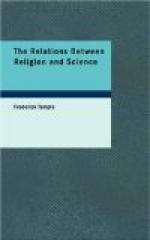Hence the strength of this belief depends on ourselves and on our own character. To every man the voice speaks. But its authority is felt in proportion to the spirituality of each who hears. Its acceptance is bound up in some way with our own wills. How far it is a matter of choice to believe or to disbelieve it is not possible to define. The will lies hidden as it were behind the emotions, the affections, the nobler impulses. The conscience shades off into the other faculties, and we cannot always isolate it from the rest. But though it be impossible to say precisely how the will is concerned in the spiritual belief, there can be no doubt that it always takes its part in such belief. It is the keen conscience, it is the will that can be moved to its depths by the conscience, that grasp most strongly the certainty of the law of duty. It is the man with the strongest and noblest aspirations, the man who sees the beauty of humility, the man who feels most strongly the deep peace of self-sacrifice, that is the man who finds the voice within most irresistible. It is not by any means always the man who lives the most correct life; correctness of life may be due to natural and not to spiritual causes. And the man whom we should find faultless in point of morals may yet be wanting in spiritual depth, and not have as yet, and perhaps may not have to the last, the spiritual faculty strong within him. But the man, even if he have many and grievous faults, who nevertheless is keenly susceptible of higher things, is the one to whom the voice within speaks with authority not to be gainsaid, and to him that voice is final.
It is this fact that the perception of things spiritual varies from man to man, and depends on character, and involves action of the will, that makes it always possible to represent our knowledge of the law of duty as in itself standing on a less sure foundation than our knowledge of scientific truth. Whether a man has or has not the necessary power of mind to comprehend scientific reasoning is tested with comparative ease. And if he have that power, the reasoning is certain in course of time to be understood, and when it is understood it compels assent so long as it keeps within its own proper domain. But the perception of spiritual truth depends on a faculty whose power or weakness it is far more difficult to test; and it involves the will which may be exerted on either side. And for this reason men sometimes dismiss this truth as being no more than an imagination, needed by some men to satisfy an emotional nature, but having no substance that can be brought to an external test. The believer in God knows that the truth which he holds is as certain as the axioms of mathematics; but he cannot make others know this whose spiritual faculty is not awake; and he is liable to be asked for proof not of the spiritual but of the physical kind.




